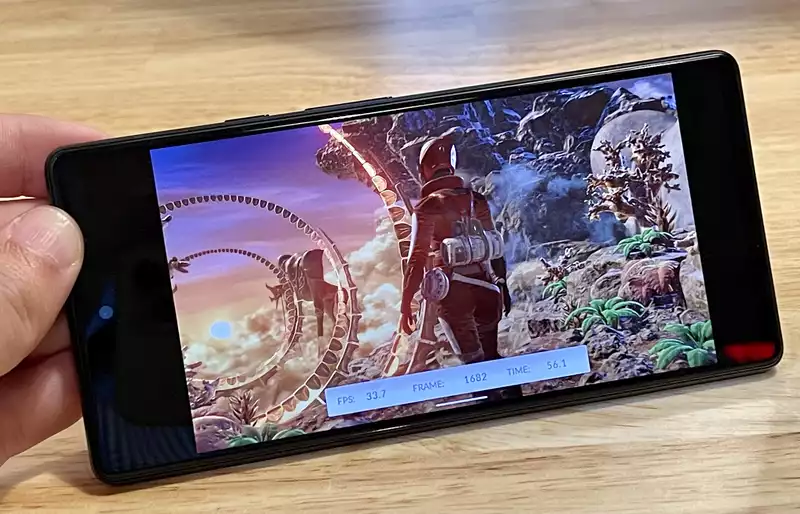How fast is Google's Tensor chip for the Pixel 6? Sure, Google may be primarily interested in boosting the phone's onboard intelligence through a dedicated Tensor Processing Unit, but will its commitment to machine learning-powered features come at the expense of overall performance?
Now that we have had the opportunity to test Google's newest flagships for our Google Pixel 6 and Google Pixel 6 Pro reviews, we have a better answer to that question. The Tensor chips in both of the new Pixels share much in common with Qualcomm's flagship system-on-chip, the Snapdragon 888, which is found in many top Android phones released this year. But the A15 Bionic chipset, which debuted in the iPhone 13 family, continues to set the pace for smartphone performance.
Here's a look at the Pixel 6 and Pixel 6 Pro benchmark test results and how Tensor's numbers compare to those of other leading smartphones.
The synthetic Geekbench 5 test measures overall performance. While not a definitive measure of a smartphone's speed, it is useful for cross-platform comparisons as well as for comparing smartphones with different generations of chipsets. This is because looking at both single-core and multi-core results can show how a phone is taking advantage of multi-cores.
This is one area where Tensor appears to be lagging behind its Snapdragon 888-powered competitors, with both single-core and multi-core results below the pace set by other Android flagships. The fastest Android phone in the test, the Snapdragon 888 Plus-powered RedMagic 6S Pro gaming phone's single-core score is 10% faster than the Pixel 6 Pro's score and its multi-core score is 34% better.
Thanks to Apple's A15 Bionic chip, no Android phone can match the iPhone 13 model. iPhone 13 Pro Max is the fastest model here, with a 65% faster multi-core score than the Pixel 6 Pro.
The lesson here is that the Tensor chip is probably not suited to take advantage of multi-core dependent apps when compared to the Snapdragon 888. Anecdotal testing showed no lag when running apps on the Pixel 6 or Pixel 6 Pro, but the results here are undeniable.
To measure graphics performance, 3DMark's Wild Life Unlimited proved to be the best way to do a cross-platform comparison of different devices. Wild Life requires complex scenes to be rendered in real time on the phone It follows the spirit of the game, which requires the phone to feature short bursts of intense activity.
When it comes to gaming, the Pixel 6 is much better, with results in 3DMark's Wild Life Unlimited comparable to most Android phones; the Pixel 6 Pro is even better, with FPS results of 35.2 FPS on the RedMagic 6S Pro and better than the Galaxy S21 Ultra. The Pixel 6 Pro's results are even more impressive, as the Snapdragon 888 Plus in the Nubia phone is specifically designed to improve graphics performance.
Again, Apple's phones are the pace-setters in this test, with the iPhone 13 and iPhone 13 Pro Max scoring 55.9 FPS and 68.4 FPS, respectively. This is well ahead of both Pixel 6 models.
We also try to run real-world tests that mimic the activities you perform when using your phone on a daily basis. Our favorite is transcoding video using the Adobe Premiere Rush app, which converts a 4K video clip to 1080p and measures how long it takes each device to complete that task. In general, this is an area where iPhones dominate, but Android devices are getting a little closer.
Again, Apple continues to dominate this test: both the iPhone 13 and iPhone 13 Pro Max can transcode a video in under 30 seconds, with the larger of the two iPhones recording the best time.
Both Pixel 6 models, however, also did well here. The Pixel 6 (49 seconds) and Pixel 6 Pro (48 seconds) beat the Galaxy Z Fold 3's 50 seconds, the best time among Android phones. (Note that the RedMagic 6S Pro does not support Adobe Premiere Rush, so the numbers are not shown here.)
The Geekbench results for the Pixel 6 model may not match the results obtained from phones with the Snapdragon 888 but they are close enough for most users. In addition, the excellent performance in graphics testing and video transcoding should alleviate concerns about the Pixel 6's performance compared to other Android devices.
The iPhone 13 model remains the king of smartphone performance. However, the Pixel 6 and its Tensor chip can compete with any other Android device.
.









Comments